Ellen and Jim Have a Blog, Too
We are two part-time academics. Ellen teaches in the English department and Jim in the IT program at George Mason University.


Trollope as political novelist; Pallisers as political films · 18 March 09
Dear Friends,
It has been a long time since I last wrote a set of 3 or 4 blogs on one of the 1974 BBC Palliser films. I left off right after Christmas, at 7:18. There has been this long hiatus (coming on 3 months) because I took out the time to write my paper on the 1991 BBC film adaptation of Clarissa and found I couldn’t teach a new course, read all Clarissa and study the film thoroughly so as to write about it as a film adaptation precisely and keep up my Palliser film study. Life got in the way too: a trip to England to an 18th century conference, and this past week a trip to NYC to see if we could move to a NYC apartment any time soon (more on this in another blog).
However, I have not given up or forgotten where I am. A third motive intervened: I became convinced the allusions to George Meredith’s Beauchamp’s Career and Trollope’s own American Senator were intended to provide a parallel framework for the films so as to lift them from a domestic drama combined with stories of life testing males and women’s romances to become an analogous political work with that of Trollope’s own series. I had noticed Raven using allusion with thematic meaning before: One struck me early on was the two fold (twice) allusion to the speech by Falstaff in Henry IV, Part 2: “I know thee not old man.” In gay or homsexual literary circles this moment is read as an old
man’s love for the young man now deserting him and is seen by gay critics as part of Shakespeare’s revelation of himself as bisexual. Raven signals us where he stands by these as well as his critical attitude towards the Duke.
What I’ve done is taken out time to read Meredith’s Beauchamp’s Career carefully and I’ve found so many parallels between it and Trollope’s Phineas books, especially if we include the Prime Minister, it would be uncanny were it not that both men were writing in the same decades, shared attitudes towards social and political arrangements and wrote political novels by trade. Among these are among them the novelist’s ability to be calmly amused and also know one must take into consideration the eanderthalian false ideas of the Tory squirearchy; the symbol of the ancient great house (Berkeley Castle is the equivalent of Gatherum, the lovely smaller house the family lives in Matching), the idealistic young man who must interact with the world on its own terms and also finds himself romancing with a series of young woman the choice of whom would shape his life ever after. I have on my site put a series of postings a group of us wrote to Trollope-l while we were reading The American Senator where I include a 1940s analysis of this novel by Clement Greenberg, likening its politics to those of mid-20th century US and UK differences. Raven is, I think, using AS and BC to provide a another framework or handle by which one can understand the series. The explicit and specifics of BC can give substance to Trollope’s tactfully general ways of dramatizing radical and conservative ideas; the contrast of AS between the UK and US is used by Trollope to critique how individuals are caught up in entrenched illiberal repressive communities and stifled or retreat if they cannot conquer: Beauchamp ends in ironic defeat; Phineas we recall wins out because he marries well, an ironic success.
I was beginning to feel it’s an impoverished perspective merely to compare the text and film from a filmic and TV standpoint which is what I had been doing. I can certainly see how Raven and his team turned the Palliser matter into a family story and thus did what it seems most TV programs do: at the core of most of them is some story about a family, and most of the time either upbeat or at least qualified stasis and support. The story of the Palliser family starting with the coerced marriage of Plantagenet and Lady Glencora, to her death, her eldest son and daughter’s marriage, and the Duke’s return to Parliament is the latter.
But as with Trollope’s books, their textual source, there is an overarching political story going on, and if it centers overtly on Phineas with Plantagenet then taking a sort of secondary adversary/support/mentor role, it includes several of the male character as variants either to the family/romance plots (for those are here too) or the political ones.
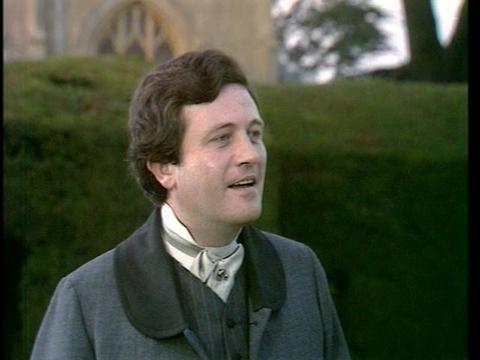
Phineas (Donal McCann) as first glimpsed in the Arcadian Matching gardens (1:1)
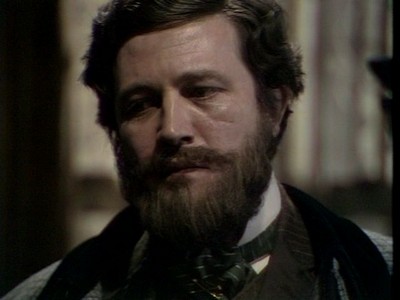
Phineas arrested on the supposition he murdered for advancement (7:18)
The long-standing characters are the political ones like Barrington Erle, with Dolly Longestaffe as chorus.
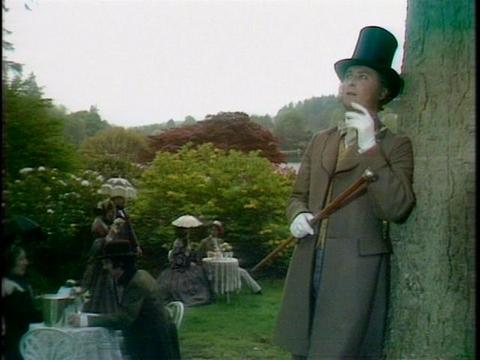
Dolly Longestaffe (Donald Pickering) as first seen a few minutes into the film series (1:1)
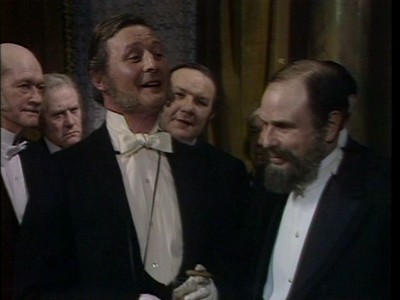
Dolly telling a salacious (nasty really) joke to the Prince Regent (8:16)
I’ve want to understand how to set this matter in both Victorian and our times. So what I’m doing is reading some articles on Meredith’s fiction, one on how women are used in Victorian political novels by Ruth Yeazell, and have gotten myself two classic books on the political novels. I may read one novel by Disraeli before I’m through (if I can stand it, Sybil, or the Two Nations) and add to my knowledge of women’s political novels in the Victorian era from Gaskell’s North and South, George Eliot’s Felix Holt, and Mary Ward’s Marcella, if I can find a really fine one.
Today I will write just about Trollope’s novels and Raven’s Palliser films as political texts then and now. now I see that Speare’s The Political Novel (old fashioned and almost frighteningly hierarcical in its assumptions, written 1924) and Howe’s more deservedly famous and humane Politics and the Novel can help. Both have the same definition of a political novel. Speare defines it this way:
“It is a work of prose fiction which leans rather to “ideas” than “emotions;” which deals rather with the machinery of law-making or with a theory about public conduct than with the merits of any given piece of legislation; and where the main purpose of the writer is party propaganda, public reform, or exposition of the lives of the personages who maintain government, or of the forces which constitute govenment. In this exposition the drawing-room is frequently used as a medium for presenting the inside life of politics.”
Trollope’s Phineas Redux and Prime Minister fit this to a “T.” I was struck by how the conversations in PR more than Phineas Finn really do argue over ideas through the presesntation of rounded characters and their adherences. For example, when Barrington Erle argues the party system is good and necessary because it prevents individual tyranny, and Phineas rejoins that such a system favors a small group of powerful cliques (families) and hinders progress, and the narrator shapes the conversation so that we see both are right and both are talking from their personal standpoint, but there is a bias to conservatism as Erle defends the status quo and families he comes from (he says they are educated to the positions and will be fairest) far more explicitly and strongly than Phineas any reform. Again in the dialogue of Phineas and the Duke in PM, both are vague and liberal.
As opposed to this, Meredith is explicit about a radical point of view and presents it forcefully: the status quo keeps land in the hands of the few, demands rents from the many. Trollope is so ginger about talking about this he often presents these as ideas that wild that no one understands and goes no further even in explaining. An article by Michael Wilding on Meredith’s Beauchamp’s Career demonstrates that although BC is an examination of the upper class world politically and its tenacity in holding on to its wealthy, privileges, use of women to keep families shut closed, it is an examination from an explicitly radical standpoint. It measure what we see by Shrapnel’s ideas (a character who combines aspects of Carlyle with radically radical ideas, like people are not owned by their family) as shows the intense selfishness and barbarity and exploitation of this group.
Howe has nothing as long or explicit as Speare as a definition; rather he talks about how a modern novel which is meant seriously is a product of ideas in conflict or dramatized, and that the political version of this is one dominated by political ideas; where attitudes about politics and how they work are dominant. His way of describing a typical 19th century plot is that a hero is profoundly involved in testing himself, and his values against the remnants of aristocratic resistance and gross symbols of the new commercial world that offends his sensibility—I’d add in Trollope’s case, he seeks to exploit: Melmotte and Lopez and Vavasour seek to exploit this new commercial world and fail; there’s a hero in Rachel Ray who seeks to exploit it and succeeds. Howe says there is a novel of sensibility as important and deep as the one about poltical ideas, public affairs and politics, but he’s not going into that. For my part in modern novels I usually prefer them, indeed love them and can’t do without reading one every couple of weeks (I just read one called Malina by Ingeborg Bachmann; Anthony Powell’s really fit here; so too Colm Toibin’s The Blackwater Lightship which I just read and was so moved by I ordered his The South from Amazon Marketplace), but I can enjoy the political novel very much: Paul Scott’s are of this kind (and a long film seriously-intended adaptation was made of it, with Charles Dance as hero); so too Elsa Morante’s Storia and Christa Wolf’s Cassandra (the latter we read and discussed on WWTTA last summer).
Howe says in such novels “the idea” of society and ideas about it rather than showing their working as such, penetrates the consciousness of the characters and can be observed in their behavior. Again I see this in Trollope. I also think it’s clearly done in BC, and it’s very explicit in American Senator. Obviously in Phineas Finn the ideas that penetrate the consciousness and behaviors of the characters are about larger party issues and land and property rights; in Phineas Redux, we have debates on the nature of parliamentary structure; in Prime Minister it’s a question of showing us how cliques build up and insider politics. If you read Trollope’s Autobiography while he says the Pallisers were to be a place he could vent his soul and goes on about the character types (say Mildmay, Gresham, Monk) as embodying types he sees in the world, and his particular beloved characters individuals caught up in the web, you see he suggests that other of his books are semi-political tales too.
The odd thing about Speare’s book to me and interesting is that he credits Disraeli with inventing this type of novel. In his chapter on Trollope which I only began he says the problem with Trollope’s tales is he himself was not an active partipator or insider in Parliament. Trollope tells us himself he knows this and only got to observe for a few months (he was given a pass). Speare seems to think this makes Trollope’s books very weak as politics and the politics unreal at times and kept to the margins. I disagree and think a more universal approach to what is political behavior which includes much outside a parliamentary council and upper class groups shape much in a large number of Trollope’s novels.
What’s interesting is how Trollope hates Disraeli’s books and calls them tinsel, unreal, horrible really, distasteful. I am wondering if the animus comes from the political ideas he finds there which to him may be anathema. Trollope presents Balzac as his progenitor (in making tales where the characters change, grow, alter with circumstances and remain themselves too), but maybe Disraeli was too, and a disliked one. Trollope doesn’t mention Meredith in his chapter on novelists in his Autobiography but he does say he will talk only of those novelists who have achieved a certain level of popularity as well as those he’s acquainted with. BC was written after the first draft of Autobiography and Trollope may have seen Meredith’s novels as caviar to the many and they were not popular like Dickens, Thackeray, were not read widely.
Another aspect of this is homosexuality. I’m struck by how Wilde’s Portrait of Dorian Grey uses the last name of Disraeli’s Vivien Grey. Gay novels as Sedgewick says projects their ideas through codes and clues. Speare says Wilde meant to allude to Disraeli and imitate his book’s surface, and of course Raven’s great Fielding Grey rewrites Dorian Grey, critiques it, and given Raven’s use of the speech from Henry IV, Part 2 (the old man poor grieving over the young man deserting him becomes not Falstaff and Hall about kingship but erotic betrayal) I think Raven would have know Vivien Grey too. I’m saying Trollope’s distaste comes from his distaste for overt homosexuality.
There are no gay characters in BC unless perhaps Renee’s brother has some aspects of such types (as Geronimo in Richardson’s Italian family does), the erotic friendship of Beauchamp and Renee’s brother like Grandison and Clementina’s brother. I don’t know enough about Meredith, but from the three novels I’ve now read (Egoist, Diana of the Crossroads and BC) I’d say he’s as centrally heterosexual and determined to be “manly” as Trollope. Trollope does break down from this in a couple of short stories and also has a couple of semi-gay males (Castle Richmond, The Claverings) and probably in his oeuvre Meredith may break down now and again and show this aspect of male experience and desire.
These are some thoughts about background and stance towards Trollope’s fiction which I hope will eventually inform any essay I write on the film adaptations of Trollope as well as his novels. I hope to do this more quickly now that I’ve finished my Clary paper. It interests me. In writing my paper on Clary (“How you all must’ve laughed. Such a witty masquerade:” 1991 Clarissa) I became aware of how much framework and implicit ideas I brought to evaluating Nokes and Barron’s film as well as Richardson’s book relied on political ideas about sexuality, family life, and human nature as delved by Richardson in the context of the 18th century went into what I said. I could not have written my paper on Northanger Abbey as a gothic novel with the three film adaptations to support me, without a thorough grounding in the gothic.
So I need more grounding in the Victorian novel and period and politics in order to write a paper which others might want to read because I want to write it and have a passionate concern with beyond the aestethics and archetypes of films.
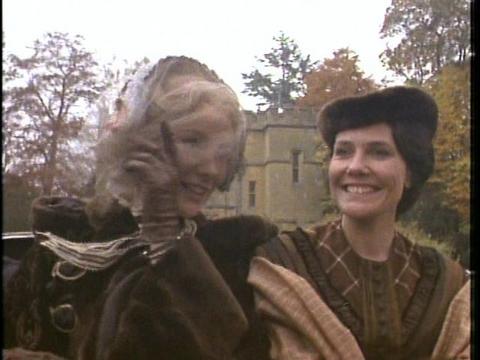
Alice Vavasour and the Lady Glencora Palliser, young women (Susan Hampsire, Caroline Mortimer) entering Matching Priory (2:3)
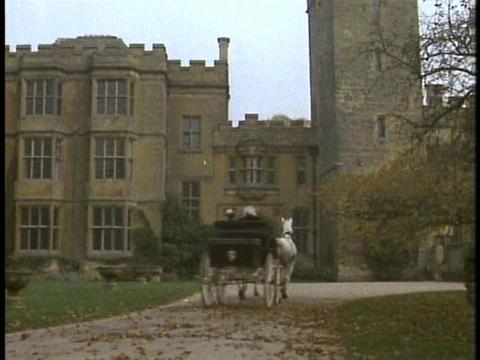
Long shot of building as they enter
And then years later the Duchess looking at herself and thinking about what’s she’s got:
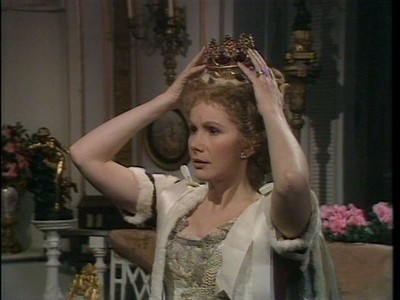
And leading Bonteen on to make a fool of himself:
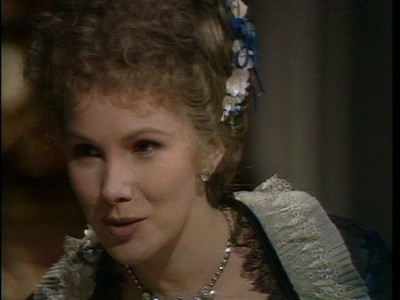
Ellen
--
Posted by: Ellen
* * *
Comment
- The stills from the early and later parts of the series I’ve put up show how the film-makers also worked to make visible one of Trollope’s explicit purposes in writing a series of novels: to trace the growth and development of his character’s personalities from youth to age: here we see them so relatively innocent and with hope and expectation of enjoyment in their faces, or lightly mocking (Dolly), then we see them sombre, controlled, turned hard-cynical, or disappointed and turned corrupt themselves as life has treated them.
E.M.
— Elinor Mar 19, 8:15am # - From Nick:
“Now I have read your terrific latest blog as well. Thinking more about Disraeli (and this is on the very limited evidence of one reading of Sybil – I certainly would not want to read any more) I think that apart from his probably thinking that Disraeli a very poor writer, and of course disliking the political ideas, is that Disraeli is so shallow on this point of power and its corruptive effects. It is certainly why those who would argue that as you write…. (I must admit that I too found Disraeli appalling - florid, absurd.)
>>In his chapter on Trollope which I only began he says the problem with Trollope’s tales is he himself was not an active partipator or insider in Parliament. Trollope tells us himself he knows this and only got to observe for a few months (he was given a pass). Speare seems to think this makes Trollope’s books very weak as politics and the politics unreal at times and kept to the margins. I disagree and think a more universal approach to what is political behavior which includes much outside a parliamentary council and upper class groups shape much in a large number of Trollope’s novels.
is an absurd claim. The Barsetshire books are intensely 'political' as well as the Palliser ones precisely because of this endless concern over power and the way in which corrupts and distorts. What is so rich in Trollope is this deep suspicion of power allied to a comprehensive understanding of its allure. Which is the endless fundamental dilemma of politics and public life. It always comes back to 'touching pitch'; power is pitch.
I'm not suggesting that all this was necessarily conscious in Trollope - just a reflection of his own ambivalence. I don't buy the story about his becoming disgusted with politics because of the corruption at the election - that sounds a cover to me; more likely to me is the idea that he could conceive of himself becoming like that .....
I think this issue [cliques] is central to his political and indeed all his writing. And there are endless ambivalences and complexities which make it so fascinating. At times his sympathies seem fully reserved for those who stand out against the crowd, the individual centrally and crucially represented by Palliser himself. How great are those passages were Palliser wanders his own grounds and none of the workers recognise him, just thinking him some intrusive stranger? Trollope idealises Palliser because he alone breaks the inexorable tie between the pursuit of power and political life.
This is why ultimately Palliser is a wholly unbelievable figure. The unambitious, intensely private man just would not rise to power. I suppose his failure reflects Trollope's recognition of that. But on many other occasions the outsider is excoriated as here with Lopez. Women who attempt to be outsiders are treated even worse as witness Lady Eustace. Is there no escaping the fact that in Trollope women basically are supposed to 'belong' to their husbands or families? Ambitious women are endlessly berated and usually brought to a sticky end (which is unreal and the reason I endlessly hark to Griselda because there Trollope was realistic).
Of course it is at times almost damned if you do. Victim or harpy rather than whore/Madonna. I know this is unfair to Trollope but at times it feels like it. Glencora and Madame M (in her later incarnations) very much rise beyond my caricature. But they are both insiders in terms of money and status."
— Elinor Mar 19, 12:40pm # - From Victoria: a citation of an article of Victorian and film studies interest in the latest issue of a journal called Adaptation: The Journal of Literature on Screen Studies. Chris Louttit, “Cranford, Popular Culture, and the Politics of Adapting the Victorian Novel for Television,” Adaptation 2009 2(1):34-48.
— Elinor Mar 19, 9:44pm # - Dear Nick,
You mention as a cental issue for Trollope: cliques. In Sadleir’s still indispensable Trollope: A commentary Sadleir says of The Warden and Barchester Towers where Sadleir argues that Trollope found himself: these books are about "caste." Sadleir says centrally Trollope was “against group-morality and jealous of caste-arrogance; therefore he was ready to attack the Church as a caste" (Sadleir’s emphasis).
From The Three Clerks to The way We Live Now Trollope exposes cliques and clique-thinking and behavior as pernicious because it favors the worst in human nature and decidedly puts what is best in us and gives joy or fulfillment to those capable of this (in non-materialist ways,ways apart from manifesting power over others) at a disadvantage.
Ellen
— Elinor Mar 19, 11:07pm # - From Nick:
“”I was reading the chapters in the PM where PP talks to Rosina of shoes and is then accosted by Pountney last night and thinking of your great insights into cliques.
It struck me this operates at several levels. Pountney (I may have spelling wrong) assumes that politics is a clique-game; he is inside the clique, so is the Duke, therefore it is fine for him to
take advantage of this. The Duke (and Trollope Iam sure) is appalled by this. So Pountney is banished from Gatherum; exiled from the clique. Really PP is an innocent idealist here because his refusal to acknowledge or play the clique-game masks and disguises the fact that he is immensely powerful.
I know the stuff about shoes is meant to be touching, and it is, but it also tends to remind me of endless anecdotes about Royalty, aristocrats, the powerful
retailing how they are ‘really’ very ordinary, have that horrible phrase ‘the common touch’. But they
aren’t ordinary – they are powerful. I love the way that Trollope uses Bungay and Glencora to try and remind PP of this. So PP is the Trollopian ideal but
he is also a myth. ”
— Elinor Mar 23, 10:41pm #
commenting closed for this article
